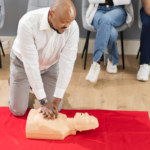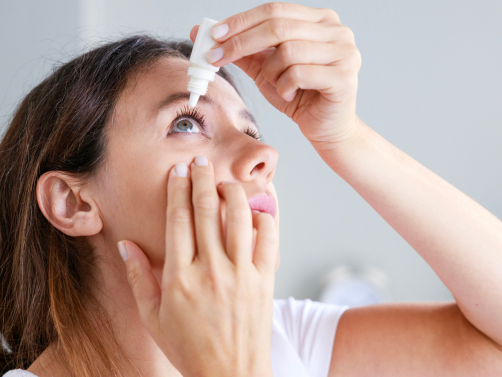Your eyes are delicate and exposed, making them especially vulnerable to sudden injuries — whether from chemical splashes or small foreign objects like dust, metal shavings, or wood splinters. Knowing how to respond quickly and correctly can protect vision, reduce damage, and prevent long-term complications. Here’s a simple guide to handling common eye emergencies safely and effectively.
1. Chemical Splashes
If chemicals (like bleach, cleaning agents, or industrial substances) get into the eye, immediate action is critical.
- Flush the eye immediately: Use clean, lukewarm water or saline. Hold the eyelid open and rinse continuously for at least 15–20 minutes.
- Avoid rubbing: This can worsen irritation or spread the chemical further.
- Remove contact lenses if present, but keep flushing the eye.
- Seek medical attention immediately: Even after rinsing, a healthcare professional should assess chemical eye injuries.
2. Foreign Objects (Dust, Metal, Wood, Sand)
Particles in the eye can scratch the cornea or cause infection if not handled carefully.
- Do not rub the eye: This increases the risk of scratching delicate tissues.
- Blink or rinse: Sometimes blinking or gentle rinsing with clean water or saline will flush out the particle.
- Pull the upper lid over the lower lid: This may encourage natural tearing to remove the object.
- Avoid using fingers or tweezers: If the object is embedded or doesn’t come out with rinsing, get medical help right away.
3. Signs You Need Emergency Care
- Persistent pain, redness, or tearing
- Vision changes or blurring
- Embedded objects or large debris
- Chemical burns or severe irritation
- Sensitivity to light
If any of these occur, seek immediate professional help — don’t delay.
Extra Tips for Prevention
- Always wear safety goggles when working with chemicals, power tools, or in dusty environments.
- Keep household chemicals out of children’s reach and use them in well-ventilated areas.
- Know where your nearest eyewash station or clean water source is, especially in workplaces.
Fast, informed action can make the difference between full recovery and permanent vision loss. Learning proper first-aid steps gives you the confidence to act decisively in these situations.
Master Injury Care.
Book your spot in our Adult CPR & First Aid Course with Survival CPR today.

Mental Health Day
We all have ‘mental health’, just as we all have ‘physical health’. And just like our physical health, we can all have times when our mental health is better than others. World Mental Health Day is a day of awareness that is observed on the 10th of October every year.

SHOP
Check out our online shop! Purchase our LATEST LAUNCH, our Online Baby and Child CPR and First Aid Course and start learning from your device at home and anywhere in the world! You can also purchase our popular Family First Aid Kits and we also offer Digital Gift Vouchers for any of

Family First Aid Kit
The Family First Aid Kit has been put together by Trauma and ICU experts to ensure your family outings always give you peace of mind.

Adult CPR & First Aid Course
Adult CPR & First Aid Course Our CPR and First Aid Course will provide you with Adult CPR and standard first aid information to meet all the requirements for certification. You will learn the appropriate skills and techniques to handle a variety of situations, from unresponsive victims to serious wounds.

CPR for Professionals Course
The Resuscitation Council CPR for Professionals Course is designed for medical professionals (physiotherapists, chiropractors, homeopaths, doctors, nurses, dentists, pharmacists etc), who are registered with the Health Professions Council of South Africa. Members of the public are also allowed to attend this course. Medical professionals who need to learn or stay

Basic Life Support Course
Basic Life Support Course This American Heart Association Course is designed for medical professionals (physiotherapists, chiropractors, homeopaths, doctors, nurses, dentists, pharmacists etc), who are registered with the Health Professions Council of South Africa. Members of the public are also allowed to attend this course. UPCOMING COURSE DATES advanced life support
Burns: do you know the different types & how to treat them?
With National Burn Awareness Week (6-12 May) still top of mind, as well as the knowledge that as we approach winter our children will be increasingly exposed to heating appliances and fires, we asked Sr. Catherine Rodwell from Survival CPR to break down the different types of burns and explain




